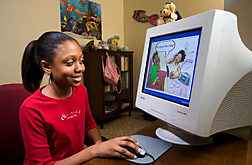This page has been archived and is being provided for reference purposes only. The page is no longer being updated, and therefore, links on the page may be invalid.
Read the magazine story to find out more. |
|
Can Video Games Help Kids Make Healthy Choices?
By Alfredo FloresMarch 14, 2006
Novel, high-tech tools are being developed by Agricultural Research Service scientists for teaching kids about healthy eating and physical activity behaviors.
At the ARS Children's Nutrition Research Center (CNRC) at the Baylor College of Medicine in Houston, Texas, researchers are using interactive computer games—and other forms of "edu-tainment"—to teach kids of various age groups about the importance of healthy food and exercise.
This study and other ARS obesity-related research is featured in the March issue of Agricultural Research magazine, published by ARS, the U.S. Department of Agriculture's chief in-house scientific research agency.
CNRC researchers have already created and evaluated several computer-based vehicles that fall under the umbrella of "eHealth" programs. The eHealth series of CNRC projects is aimed at engaging children in studies promoting healthy nutrition or physical activity behaviors, using devices such as the Internet, video games, Web-based games, comic books, cartoons and other contemporary media.
One of the latest efforts, called "Food, Fun and Fitness Internet Program for Girls," focuses on preventing obesity among 8- to10-year-old African-American girls. This group has been identified as having potentially higher-than-normal obesity rates and being at a greater risk of heart disease, some cancers, diabetes and stroke when they grow up.
Behavioral scientist Deborah Thompson was the principal CNRC investigator for this interactive online computer program. She led the research team in developing and refining the design and in evaluating the effectiveness of the approach. Its primary goal was to promote an increase in two behaviors: physical activity and consumption of fruit, vegetables, juices and water—both important health habits that Thompson hopes young girls will carry into adulthood.
The Internet program focuses on culturally sensitive Web-based comic strips that model healthy behaviors. In an 8-week study of the Food, Fun and Fitness Internet Program for Girls with 80 8- to 10-year-old African-American girls in the Houston area, Thompson examined the effect of immediate versus delayed incentives on the log-on rate to the CNRC's eHealth program website. Preliminary results suggest that eHealth programs may be an effective way to help young African-American girls increase fruit and vegetable intake and become more physically active, thereby decreasing their obesity risk.
Read more about this research in the March 2006 issue of Agricultural Research magazine.

